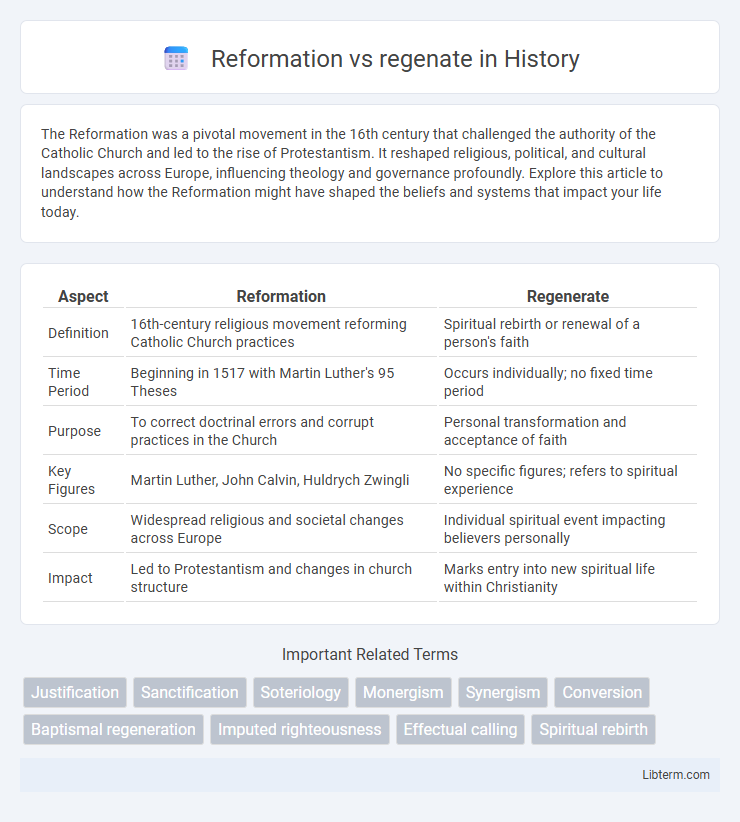The Reformation was a pivotal movement in the 16th century that challenged the authority of the Catholic Church and led to the rise of Protestantism. It reshaped religious, political, and cultural landscapes across Europe, influencing theology and governance profoundly. Explore this article to understand how the Reformation might have shaped the beliefs and systems that impact your life today.
Table of Comparison
| Aspect | Reformation | Regenerate |
|---|---|---|
| Definition | 16th-century religious movement reforming Catholic Church practices | Spiritual rebirth or renewal of a person's faith |
| Time Period | Beginning in 1517 with Martin Luther's 95 Theses | Occurs individually; no fixed time period |
| Purpose | To correct doctrinal errors and corrupt practices in the Church | Personal transformation and acceptance of faith |
| Key Figures | Martin Luther, John Calvin, Huldrych Zwingli | No specific figures; refers to spiritual experience |
| Scope | Widespread religious and societal changes across Europe | Individual spiritual event impacting believers personally |
| Impact | Led to Protestantism and changes in church structure | Marks entry into new spiritual life within Christianity |
Introduction: Understanding Reformation and Regeneration
Reformation refers to the process of moral improvement or spiritual renewal within an individual, often emphasizing behavioral changes and adherence to religious principles. Regeneration, in contrast, denotes a profound spiritual rebirth or transformation, signifying a complete renewal of the heart and soul through divine intervention. Distinguishing between reformation and regeneration is crucial in theological discussions for understanding the depth of spiritual change.
Defining Reformation: Surface-Level Change
Reformation refers to a surface-level change in behavior or habits that reflects an outward improvement without necessarily transforming the core nature or inner character. Unlike regeneration, which signifies a profound spiritual rebirth and transformation, reformation involves modifying actions while the underlying heart remains unchanged. This distinction highlights that true transformation requires more than external adjustments; it demands a renewed inner life.
What is Regeneration? Inner Spiritual Renewal
Regeneration refers to the inner spiritual renewal that transforms an individual's heart and mind, enabling a new, vibrant relationship with God. This process involves the Holy Spirit's work to recreate the believer's nature, making them spiritually alive and receptive to faith. Unlike the broader historical Reformation, regeneration specifically addresses personal, internal change rather than institutional or doctrinal reform.
Historical Context: Reformation in Religion and Society
The Reformation, beginning in the early 16th century, marked a profound transformation in religious thought and European society, challenging the authority of the Catholic Church and leading to the rise of Protestant denominations. This movement, spearheaded by figures such as Martin Luther and John Calvin, emphasized concepts like salvation by faith alone and the authority of Scripture, contrasting with the Catholic emphasis on tradition and sacraments. The Reformation's impact extended beyond theology, influencing political structures, education, and cultural norms, thereby reshaping the socio-religious landscape of Europe.
Theological Foundations of Regeneration
Regeneration, rooted in Reformation theology, emphasizes the transformative work of the Holy Spirit in imparting new spiritual life to the believer, effectively changing their nature from dead in sin to alive in Christ. This concept aligns with doctrines articulated by Reformers such as Martin Luther and John Calvin, who underscored total depravity and the necessity of divine intervention for salvation. Theologically, regeneration precedes faith and is essential for justification, underscoring God's sovereign grace as the foundation for spiritual rebirth and eternal life.
Key Differences Between Reformation and Regeneration
Reformation refers to a conscious decision to change behavior and improve oneself through external efforts, while regeneration involves a spiritual transformation brought by divine intervention, resulting in a new nature. Key differences include reformation being temporary and dependent on human will, whereas regeneration is permanent and initiated by God's grace. Regeneration produces an inward change of heart, enabling sustained holiness, unlike reformation which typically affects only outward actions.
Reformation: External Actions vs. Regenerate: Internal Transformation
Reformation emphasizes external actions such as moral improvements, religious observances, and behavioral changes to demonstrate faith and righteousness. Regenerate focuses on internal transformation, highlighting a spiritual rebirth and an inward renewal of the heart and mind, leading to genuine faith and lasting change. Understanding the contrast between outward reformation and inward regeneration is crucial for grasping the depth of true spiritual conversion in Christian theology.
Impact on Personal Life: Reformed vs. Regenerated Individuals
Reformed individuals often emphasize a lifelong process of sanctification, seeking to align their behavior with biblical teachings through disciplined study and community involvement. Regenerated individuals typically experience an immediate transformation marked by a renewed heart and spiritual rebirth, resulting in a deep personal conviction and desire for holiness. Both perspectives highlight significant changes in personal life, but reformation focuses on continuous growth, whereas regeneration centers on the initial spiritual renewal.
Lasting Change: Which Produces True Transformation?
Reformation emphasizes external modifications in behavior or structure, while regeneration centers on an internal, spiritual rebirth leading to profound transformation. True lasting change emerges from regeneration, as it fundamentally alters an individual's nature rather than merely adjusting their actions. The theological consensus highlights regeneration as the key to genuine, enduring transformation that redefines identity and purpose.
Conclusion: Choosing Reformation or Regeneration
Choosing between Reformation and Regeneration hinges on the depth of spiritual transformation sought; Reformation refers to external behavioral changes, while Regeneration implies a profound inner renewal of the heart and soul. Effective spiritual growth requires embracing Regeneration, which aligns with biblical teachings on new birth and lasting holiness. Thus, prioritizing Regeneration fosters authentic, enduring faith beyond mere moral improvements characteristic of Reformation.
Reformation Infographic

 libterm.com
libterm.com